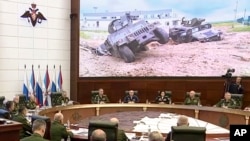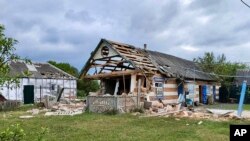The White House says it is looking into reports about the alleged use of U.S.-provided equipment in what appeared to be a raid by anti-Putin Russian volunteers Monday in the Belgorod region in Russia, although the U.S. cannot confirm the claim.
"We don't support the use of U.S.-made equipment for attacks inside Russia. And we've been clear about that with the Ukrainians. We've been nothing but consistent about our concerns in that regard,” National Security Council spokesperson John Kirby said Wednesday.
Russia called Monday’s incident an incursion by saboteurs deployed by Kyiv, with officials and state media using various epithets ranging from “militants” to “terrorists.”
Ukraine denied involvement in this week's Belgorod incident, calling it an act by disgruntled Russians.
Earlier, Pentagon press secretary Brigadier General Pat Ryder confirmed that the U.S. government had not approved any third-party transfers of equipment to paramilitary organizations outside the Ukrainian armed forces, nor had the Ukrainian government requested any such transfers.
"The United States has communicated regularly with Ukraine that the security assistance that we're providing them is for them to use inside Ukraine, as part of their efforts to defend their country and their sovereignty,” said Ryder.
He noted the Pentagon could not confirm the veracity of the images with the alleged U.S.-provided vehicles inside Russia.
“I don't know if it's true or not,” said Ryder. He pointed out that a couple days ago there were “some bogus images” of reported explosions at the Pentagon, which never happened. “We have to take a look at these things and make sure we get the facts before we make assumptions.”
When asked by reporters about the fighters’ use of U.S.-made hardware, Kremlin spokesman Dmitry Peskov said Wednesday, "It is no secret for us that more and more equipment is being delivered to Ukraine's armed forces."
Previously, the Russian government released images of the alleged American Humvees, which according to the Russians were destroyed near Belgorod. Some users on Twitter, however, suggested the images with the trucks might have been staged.
Russia’s vulnerability
The raid in the Belgorod region means the Russians cannot effectively protect their borders, analysts told VOA.
The Russians did not expect the battles would move to their territory, said George Barros, a Russia analyst at the Washington-based Institute for the Study of War, or ISW.
“If these Russian volunteers indeed penetrated as deep as they claim to have, then it demonstrates that Russian field fortifications don't really mean anything if they're not sufficiently manned,” Barros said. He added that the raid exposed the vulnerability of Russia’s defense lines.
“I'm sure a lot of people have seen all those maps of the extensive lines that the Russians have dug all across the entire front line. Some analysts have argued that these extensive field fortifications and trenches mean that the Ukrainians are going to have a hard time moving,” he said.
"But if you don't have enough soldiers physically occupying those lines, then they're not going to be effective at preventing maneuver. And we know that for the entirety of the Ukrainian front line, which is about a little over 1,000 kilometers long, the Russian forces do not have enough infantry to be able to physically occupy to effectively defend the entirety of it,” Barros said.
Former Ukrainian Defense Minister Andriy Zagorodnyuk, now head of the Center for Defense Strategies, a Ukrainian security think tank, said that until this point, observers had seen mostly bombings or other forms of sabotage inside Russia. Now, "the idea of the inviolability of Russia as a territory was seriously undermined," he told VOA.
“Here, we are talking about armed personnel who entered the territory of the Russian Federation and stayed there for some time," Zagorodnyuk said. "Therefore, people who are citizens of Russia demonstrated to Russia that it is not protected. The idea that Russia is physically untouchable and completely protected from different threats or raids from any side is a fiction. Russia is as vulnerable as many other countries."
Raid objective
Ilya Ponomarev, a political representative of the "Freedom of Russia" Legion that was involved in the raid, told VOA that the goal of the Belgorod operation was to "create a piece of free Russia and keep it as long as possible."
Ponomarev said another objective was to distract the Russian army from the Ukrainian front line ahead of the expected Ukrainian offensive. “The Russians were surprised. They didn’t expect this.”
He said Ukraine's role was minimal and emphasized that none of the Ukrainian military participated in the operation, only Russian citizens.
Ponomarev said he was hopeful that the Russian volunteers could free the country from the current regime. "This is our country, and we will liberate it. ... There will be a new flag and a new government," he said.
Alexander Vindman, former director for European affairs at the U.S. National Security Council, said this could be significant. "It seems to me that this is actually a Russian separatist movement - maybe with the support of Ukraine, but they act independently, achieving their own goals," he told VOA.
ISW analysts said that so far they had not seen any unusual movement of Russian troops.
Regardless, Barros said events in the Belgorod region have caused a certain degree of panic, factionalism and incoherency within the Russian informational space.
“Frankly, I think Russian sources have done much more to actually amplify and create panic around these particular raids, more so than the Ukrainian information space,” he said.
VOA’s Tatiana Vorozhko and Iryna Matviichuk contributed to this report. Some information came from The Associated Press and Reuters.





